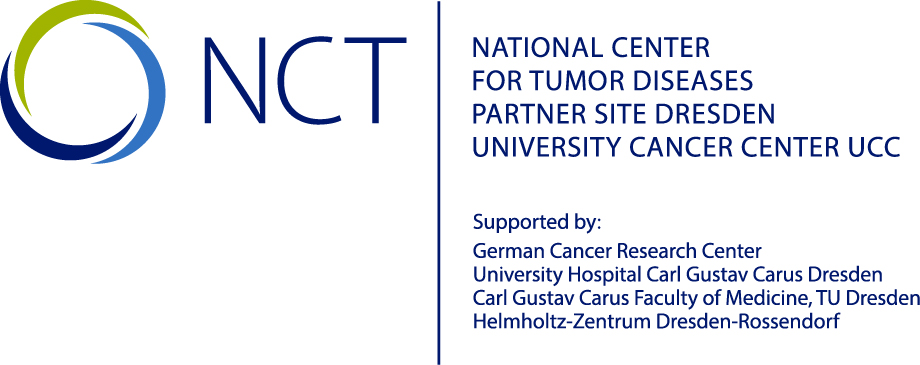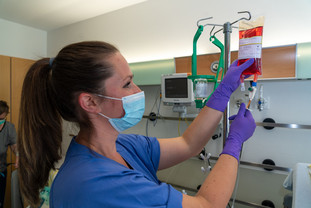The diagnosis of acute myeloid leukemia (AML) was previously considered a medical emergency requiring immediate treatment. Scientists and physicians of the University Hospital Carl Gustav Carus Dresden and National Center for Tumor Diseases Dresden (NCT/UCC), together with colleagues from 23 other hospitals throughout Germany, have now been able to show that the time between the diagnosis and the start of intensive initial treatment has no influence on the success of the therapy and the survival probability of the patients. The results of the largest study to date on this issue show that for AML patients in good general condition, it is reasonable to wait for important laboratory results before making a decision on the best available treatment option. In view of newly approved treatment options, these specific laboratory results have direct clinical implications. At the end of last year, the results of the study already led to an adjustment of the German guideline for the diagnosis and therapy of AML. The study included the data of 2,263 AML patients from the nationwide Study Alliance Leukemia registry (SAL). The detailed publication on the topic appeared today on the website of the journal "Blood" (DOI 10.1182/blood.2019004583).
The National Center for Tumor Diseases Dresden (NCT/UCC) is a joint institution of the German Cancer Research Center (DKFZ), the University Hospital Carl Gustav Carus Dresden, Carl Gustav Carus Faculty of Medicine at TU Dresden and the Helmholtz-Zentrum Dresden-Rossendorf (HZDR).
With 3.5 new diagnoses per 100,000 inhabitants per year, acute myeloid leukemia (AML) is a rare disease but the most frequent form of acute leukemia in Germany. It develops quite suddenly and progresses rapidly. If the disease remains untreated, patients only survive for an average of approximately 17 weeks after diagnosis. The general recommendation has therefore been to start therapy immediately - if possible on the same day - when AML is diagnosed. Several recent studies have already raised doubts about this assessment. The present Germany-wide study, led by scientists and physicians of the University Hospital Carl Gustav Carus Dresden and National Center for Tumor Diseases Dresden (NCT/UCC), uses the broadest database available to date and extensive analytical methods to show that the length of time from diagnosis to the start of intensive initial treatment has no influence on the probability of survival and the response to therapy of AML patients.
"The results show that it is reasonable to first wait for genetic and other laboratory results in patients in good general condition. These provide the basis for choosing a highly effective, targeted therapy against certain disease characteristics that are only present in some patients. These treatment options cannot be used if intensive standard chemotherapy is started immediately. Patients can thus benefit from a delay in the start of treatment," explains Prof. Martin Bornhäuser, Director of the Medical Clinic I of the University Hospital Dresden and member of the Executive Board of the NCT/UCC Dresden.
In their investigation, the scientists used a data set of 2,263 AML patients from the Study Alliance Leukemia registry (SAL), which collects data from 46 treatment centers throughout Germany. The study included patients who received comparable initial treatment with intensive chemotherapy and whose disease progression was followed for at least one year. The scientists used various statistical methods for their analysis, which also took into account the possible influence of other parameters relevant for the prognosis. The results showed that, for example, genetic risk factors or the age of the patients have a significant influence on the probability of survival and the effectiveness of a therapy. However, no such influence could be shown for the period from diagnosis to the start of therapy. In the data set examined, the time period ranged from a few hours to 50 days. For genetic and other analyses, up to two weeks are required in clinical routine.
The results of their investigation, a summary of which the scientists presented at the congress of the American Society of Hematology (ASH) last year, led to an adaptation of the German guideline for the diagnosis and therapy of AML. "They form the basis for a paradigm shift in the treatment of AML patients. This reduces the pressure on physicians to make immediate therapy decisions. In the future, more targeted treatments could be used, which is also of great relevance in view of the dynamics of how drugs targeted at individual disease characteristics are currently being approved. However, it remains true that if serious complications are already present at the time of diagnosis, it is important to start treatment immediately. In any case, unnecessary delays in the treatment of AML should be avoided," says Prof. Christoph Röllig, senior physician at the Medical Clinic I of the University Hospital Dresden.
Publication:
Christoph Röllig, Michael Kramer, Christoph Schliemann, Jan-Henrik Mikesch, Björn Steffen, Alwin Krämer, Richard Noppeney, Kerstin Schäfer-Eckart, Stefan Krause, Mathias Hänel, Regina Herbst, Volker Kunzmann, Hermann Einsele, Edgar Jost, Tim H. Brümmendorf, Sebastian Scholl, Andreas Hochhaus, Andreas Neubauer, Kristina Sohlbach, Lars Fransecky, Martin Kaufmann, Dirk Niemann, Markus Schaich, Norbert Frickhofen, Alexander Kiani, Frank Heits, Ulrich Krümpelmann, Ulrich Kaiser Johannes Kullmer, Maxi Wass, Friedrich Stölzel, Malte von Bonin, Moritz Middeke, Christian Thiede, Johannes Schetelig, Wolfgang E Berdel, Gerhard Ehninger, Claudia D Baldus, Carsten Müller-Tidow, Uwe Platzbecker, Hubert Serve, Martin Bornhäuser: Does time from diagnosis to treatment affect the prognosis of patients with newly diagnosed acute myeloid leukemia?
Blood, DOI: https://doi.org/10.1182/blood.2019004583
Press Contact:
Dr. Anna Kraft
National Center for Tumor Diseases Dresden (NCT/UCC)
Press and public relations work
Phone: +49 (0)351 458-5548
E-mail: anna.kraft@nct-dresden.de
preview.nct-heidelberg.de







